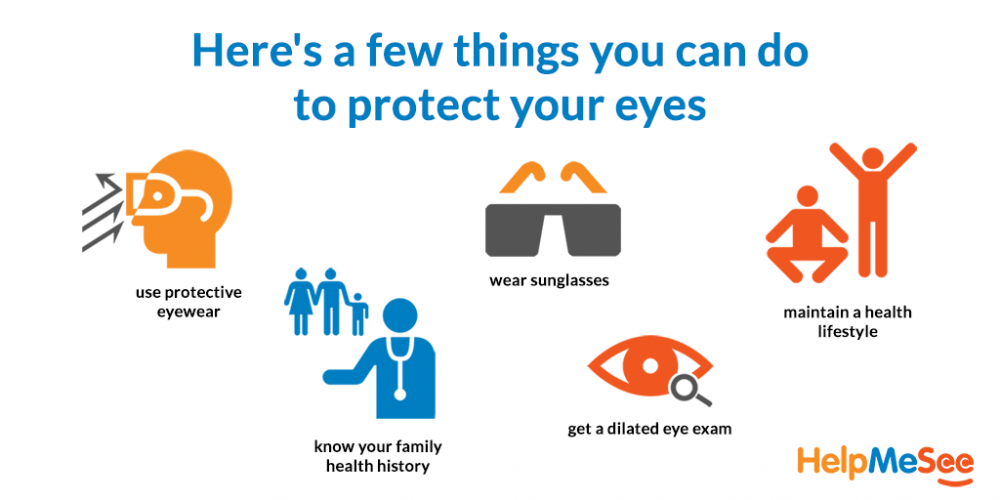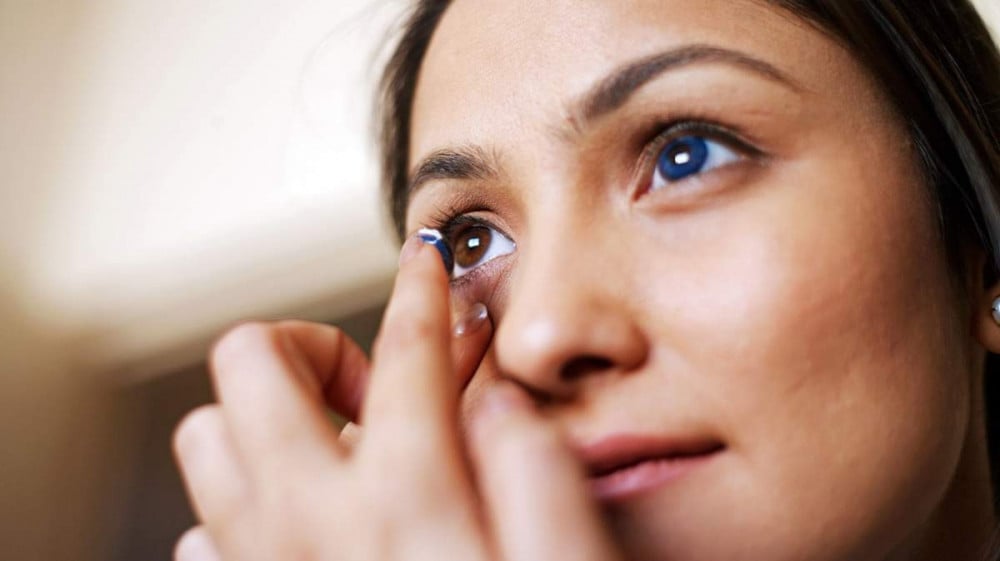Maintaining Good Eye Health: Tips for Protecting Your Vision
The eyes are one of the most important organs in the human body, and they require special attention to maintain their health. In today's digital age, many people spend a significant amount of time staring at screens, which can lead to eye strain and other problems. Therefore, it's essential to take the necessary steps to protect your eyes and maintain their health. In this article, we will discuss everything you need to know to keep your eyes healthy.
Eye Health Tips
There are several things you can do to protect your eyes and maintain their health. First, it's important to have regular eye exams to ensure that your eyes are in good condition. Second, you should eat a healthy and balanced diet that includes plenty of fruits and vegetables, as they are rich in vitamins and minerals that are essential for eye health. Third, make sure to wear protective eyewear when engaging in activities that could potentially harm your eyes, such as sports, DIY projects, or working with chemicals.
Computer Eye Strain
With the increase in the use of computers and other digital devices, many people suffer from eye strain or Computer Vision Syndrome (CVS). Symptoms of CVS include eye fatigue, headaches, dry eyes, and blurred vision. To prevent eye strain, take frequent breaks from your computer screen, adjust the lighting in your room, and maintain a comfortable distance between your eyes and the screen.
Protecting Your Eyes from the Sun
Sun exposure can be harmful to your eyes, just as it can be harmful to your skin. Therefore, it's important to wear sunglasses that provide adequate UV protection when spending time outdoors, especially during peak hours when the sun's rays are the strongest. Sunglasses with polarized lenses can also reduce glare and improve vision in bright sunlight.
Proper Contact Lens Care
If you wear contact lenses, it's essential to follow proper care instructions to avoid eye infections and other problems. Always wash your hands before handling your contacts, clean them regularly with a solution recommended by your eye doctor, and never wear them for longer than recommended. Additionally, never share your contact lenses with others or sleep in them.
Maintaining eye health is crucial for overall well-being, and it's essential to take the necessary steps to protect your eyes. By having regular eye exams, eating a healthy diet, wearing protective eyewear, taking breaks from computer screens, wearing sunglasses, and properly caring for contact lenses, you can keep your eyes healthy for years to come. Remember that prevention is key, and by following these tips, you can minimize the risk of eye problems and maintain optimal vision.
Additional Tips for Eye Health
In addition to the tips mentioned above, there are several other things you can do to keep your eyes healthy. These include:
- Exercise regularly: Regular exercise can help improve blood circulation, which is essential for healthy eyes.
- Get enough sleep: Getting enough rest is crucial for eye health. Lack of sleep can cause eye fatigue and other problems.
- Avoid smoking: Smoking can increase the risk of several eye problems, including cataracts and macular degeneration.
- Stay hydrated: Drinking plenty of water can help prevent dry eyes and other eye problems.
- Manage chronic conditions: If you have a chronic condition such as diabetes or high blood pressure, it's important to manage it properly as it can affect eye health.
- Follow safety precautions: When engaging in activities such as sports or using power tools, it's essential to wear appropriate eye protection to avoid eye injuries.
When to See an Eye Doctor
Even if you take all the necessary precautions, eye problems can still occur. Therefore, it's essential to know when to see an eye doctor. Some signs that indicate you should see an eye doctor include :
- Blurred or double vision
- Eye pain or discomfort
- Redness or swelling of the eye
- Sensitivity to light
- Flashes of light or floaters
- Loss of peripheral vision
- Changes in color vision
If you experience any of these symptoms, it's important to see an eye doctor as soon as possible. Early detection and treatment can help prevent further complications and preserve your vision.
Maintaining eye health is crucial for overall well-being, and there are several things you can do to protect your eyes. By following the tips mentioned in this article, you can minimize the risk of eye problems and maintain optimal vision. Remember to have regular eye exams, eat a healthy diet, wear protective eyewear, take breaks from computer screens, wear sunglasses, and properly care for contact lenses. Additionally, exercise regularly, get enough sleep, avoid smoking, stay hydrated, manage chronic conditions, and follow safety precautions. Lastly, always seek medical attention if you experience any symptoms of eye problems.
Importance of Eye Health
Maintaining good eye health is crucial as our eyes are one of the most complex and vital organs in our body. They allow us to see the world around us, communicate, and perform daily activities. Poor eye health can affect our quality of life and lead to vision loss or blindness. In fact, according to the World Health Organization (WHO), approximately 2.2 billion people worldwide suffer from vision impairment, with uncorrected refractive errors being the leading cause. Therefore, taking care of our eyes should be a top priority.
Eye-Related Diseases
Several eye-related diseases can affect our vision and overall eye health. Some of the most common eye diseases include:
- Cataracts: A clouding of the eye's natural lens, causing blurred vision.
- Glaucoma: A group of eye diseases that damage the optic nerve and can lead to vision loss or blindness.
- Age-related macular degeneration: A gradual loss of central vision due to damage to the macula, a part of the retina.
- Diabetic retinopathy: A complication of diabetes that damages blood vessels in the retina and can cause vision loss.
- Dry eye syndrome: A condition in which the eyes do not produce enough tears or produce poor-quality tears, causing discomfort and vision problems.
Early detection and treatment of these diseases are essential to prevent further complications and preserve vision.
Eye Health and Age
As we age, our eyes undergo several changes that can affect our vision and eye health. Some of the most common age-related eye problems include presbyopia, cataracts, and age-related macular degeneration. Therefore, it's important to have regular eye exams as we age to detect and treat any eye-related problems early on.
Maintaining good eye health is crucial to our overall well-being. By following the tips mentioned in this article and seeking medical attention when needed, we can protect our eyes from disease and maintain optimal vision. Remember to have regular eye exams, eat a healthy diet, wear protective eyewear, take breaks from computer screens, wear sunglasses, and properly care for contact lenses. Additionally, exercise regularly, get enough sleep, avoid smoking, stay hydrated, manage chronic conditions, and follow safety precautions. By taking care of our eyes, we can enjoy good vision and a high quality of life.
Eye-Healthy Diet
A healthy diet can play a significant role in maintaining good eye health. Nutrients such as omega-3 fatty acids, vitamins A, C, and E, and zinc are essential for eye health. Some foods that are rich in these nutrients include:
- Leafy greens: Spinach, kale, and collard greens are rich in lutein and zeaxanthin, which can help prevent cataracts and macular degeneration.
- Fish: Fatty fish such as salmon, tuna, and trout are rich in omega-3 fatty acids, which can help prevent dry eyes and macular degeneration.
- Eggs: Eggs are a good source of lutein and zeaxanthin, which can help prevent cataracts and macular degeneration.
- Citrus fruits: Oranges, grapefruits, and lemons are rich in vitamin C, which can help prevent cataracts and age-related macular degeneration.
- Nuts and seeds: Almonds, walnuts, and flaxseeds are rich in omega-3 fatty acids and vitamin E, which can help prevent dry eyes and macular degeneration.
By incorporating these foods into your diet, you can help protect your eyes from disease and maintain good eye health.
Taking Breaks from Screens
In today's digital age, many of us spend a significant amount of time in front of screens, whether it's a computer, tablet, or smartphone. Prolonged screen time can cause eye strain, dry eyes, and other vision problems. Therefore, it's essential to take breaks from screens to prevent eye problems. The American Academy of Ophthalmology recommends the 20-20-20 rule, which involves taking a 20-second break every 20 minutes to look at something 20 feet away. This can help reduce eye strain and prevent other screen-related eye problems.
Protecting Your Eyes from the Sun
Exposure to ultraviolet (UV) rays from the sun can increase the risk of several eye problems, including cataracts and macular degeneration. Therefore, it's essential to protect your eyes from the sun's harmful rays by wearing sunglasses with UV protection. When choosing sunglasses, make sure they provide 100% UV protection and cover your eyes completely.
Properly Caring for Contact Lenses
If you wear contact lenses, it's essential to take proper care of them to avoid eye infections and other problems. Some tips for proper contact lens care include:
- Wash your hands thoroughly before handling your contact lenses.
- Use only recommended solutions for cleaning and storing your contact lenses.
- Replace your contact lens case every three months.
- Follow your eye doctor's instructions for wearing and caring for your contact lenses.
By properly caring for your contact lenses, you can help prevent eye infections and other problems.
Maintaining good eye health requires taking several measures, including eating a healthy diet, taking breaks from screens, protecting your eyes from the sun, and properly caring for contact lenses. By following these tips and seeking medical attention when necessary, we can protect our eyes from disease and maintain optimal vision. Remember to have regular eye exams, eat a healthy diet, wear protective eyewear, take breaks from computer screens, wear sunglasses, and properly care for contact lenses. By taking care of our eyes, we can enjoy good vision and a high quality of life.
Regular Eye Exams
Regular eye exams are crucial for maintaining good eye health. Eye exams can detect eye problems early on, making them easier to treat. Many eye diseases, such as glaucoma and macular degeneration, don't have any noticeable symptoms in the early stages, so regular eye exams are essential for early detection. The American Academy of Ophthalmology recommends that adults get a comprehensive eye exam at least once every two years, or more frequently if they have certain risk factors, such as a family history of eye disease.
Getting Enough Sleep
Getting enough sleep is essential for overall health, including eye health. Lack of sleep can cause eye fatigue and dry eyes, making it harder to focus and increasing the risk of eye strain. It's recommended that adults get seven to eight hours of sleep per night to maintain good eye health.
Quitting Smoking
Smoking is harmful to overall health, including eye health. Smoking increases the risk of several eye problems, including cataracts, macular degeneration, and optic nerve damage. Quitting smoking can reduce the risk of these problems and improve overall health.
Managing Chronic Health Conditions
Chronic health conditions such as diabetes and high blood pressure can increase the risk of eye problems such as diabetic retinopathy and hypertensive retinopathy. Therefore, managing these conditions is crucial for maintaining good eye health. It's essential to follow your healthcare provider's recommendations for managing chronic health conditions, including taking medications as prescribed, monitoring blood sugar and blood pressure levels, and maintaining a healthy lifestyle.
By following these tips for maintaining good eye health, you can protect your eyes from disease and enjoy good vision throughout your life. Remember to eat a healthy diet, take breaks from screens, protect your eyes from the sun, properly care for contact lenses, have regular eye exams, get enough sleep, quit smoking, and manage chronic health conditions. If you experience any changes in your vision, seek medical attention promptly to prevent further damage.
In conclusion, taking care of your eyes is essential for maintaining good vision and overall health. By following the tips outlined in this article, you can protect your eyes from disease and maintain good vision throughout your life. Remember to eat a healthy diet, take breaks from screens, protect your eyes from the sun, properly care for contact lenses, have regular eye exams, get enough sleep, quit smoking, and manage chronic health conditions. If you experience any changes in your vision, seek medical attention promptly to prevent further damage. By prioritizing your eye health, you can enjoy clear vision and healthy eyes for years to come.




